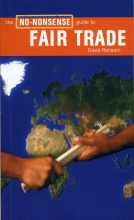

|
|

The No-Nonsense Guide to Fair Trade
Ransom, David
Publisher: Between the Lines, Toronto, CanadaYear Published: 2001 Pages: 144pp Price: $15 ISBN: 1-896357-47-4 Library of Congress Number: HF1379.N66 2001 Dewey: 382 Resource Type: Book Cx Number: CX6697 Ransom suggests that fair, environmentally-conscious trade is not only a viable alternative to unfair free trade, but that it is the way of the future. Abstract: The No-Nonsense Guide To Fair Trade begins with a brief overview of the history of international trade, highlighting the unfair characteristics of free trade and the need for a viable alternative. David Ransom proposes that this alternative exists, albeit on a small scale, in fair trade ventures around the world. He states that fair trade is concerned with "reasserting human control over a mechanism that claims to be in the best interests of everyone but no longer even bothers to prove it," giving a human dimension to the free market. In the following four chapters, Ransom uses case studies to discuss the pitfalls of free trade and the potential of fair trade. Often seen through the lens of the author's own travel experiences, the cases introduce the reader to a variety of individuals in Latin America and Africa. Ransom tells of a Peruvian coffee farmer whose livelihood is subjected to the whims of the international commodity market, but also of a banana farmer in the Dominican Republic who successfully produces fair trade, organic crops. Each of these individuals is affected by the dominant economic regime of free trade and many engender an optimistic vision of fair trade as an alternative. The final chapters examine free trade and fair trade from the perspective of purchasers. Integrating economic terminology, a critique of international institutions such as the World Trade Organization, and real-life stories, Ransom proposes that consumers can make intentional changes in patterns of consumption to make a difference in the world. He suggests that fair, environmentally-conscious trade is not only a viable alternative to unfair free trade, but that it is the way of the future. [Abstract by Tara McElroy] Table of Contents Foreword Introduction 1. Mexico: a cautionary tale 2. Coffee in Peru: life on the edge 3. Cocoa in Ghana: a way of life 4. Bananas in Guatemala and the Caribbean: seeing perfection 5. Blue jeans" beaten by the brand 6. Buying it: fair trade in the North Conclusion: an infant among giants Contacts Bibliography Index Subject Headings
|